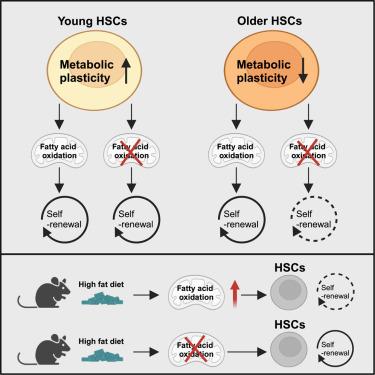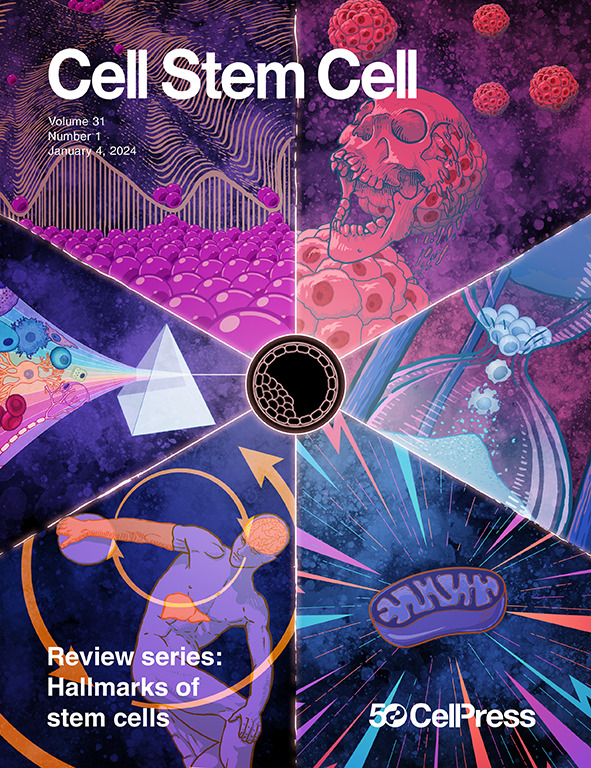Different effects of fatty acid oxidation on hematopoietic stem cells based on age and diet
IF 20.4
1区 医学
Q1 CELL & TISSUE ENGINEERING
引用次数: 0
Abstract
Fatty acid oxidation is of uncertain importance in most stem cells. We show by 14C-palmitate tracing and metabolomic analysis that hematopoietic stem/progenitor cells (HSPCs) engage in long-chain fatty acid oxidation that depends upon carnitine palmitoyltransferase 1a (CPT1a) and hydroxyacyl-CoA dehydrogenase (HADHA) enzymes. CPT1a or HADHA deficiency had little or no effect on HSPCs or hematopoiesis in young adult mice. Young HSPCs had the plasticity to oxidize other substrates, including glutamine, and compensated for loss of fatty acid oxidation by decreasing pyruvate dehydrogenase phosphorylation, which should increase function. This metabolic plasticity declined as mice aged, when CPT1a or HADHA deficiency altered hematopoiesis and impaired hematopoietic stem cell (HSC) function upon serial transplantation. A high-fat diet increased fatty acid oxidation and reduced HSC function. This was rescued by CPT1a or HADHA deficiency, demonstrating that increased fatty acid oxidation can undermine HSC function. Long-chain fatty acid oxidation is thus dispensable in young HSCs but necessary during aging and deleterious with a high-fat diet.

脂肪酸氧化对造血干细胞的不同影响基于年龄和饮食
脂肪酸氧化在大多数干细胞中的重要性尚不确定。我们通过14C-棕榈酸酯追踪和代谢组学分析表明,造血干细胞/祖细胞(HSPCs)进行长链脂肪酸氧化依赖于肉碱棕榈酰转移酶1a(CPT1a)和羟基乙酰-CoA脱氢酶(HADHA)。缺乏CPT1a或HADHA对幼年成年小鼠的HSPC或造血几乎没有影响。年轻的 HSPCs 具有氧化其他底物(包括谷氨酰胺)的可塑性,并通过降低丙酮酸脱氢酶的磷酸化来补偿脂肪酸氧化的损失,从而增强功能。这种代谢可塑性随着小鼠的衰老而下降,CPT1a或HADHA缺乏会改变造血,并在连续移植时损害造血干细胞(HSC)的功能。高脂肪饮食会增加脂肪酸氧化,降低造血干细胞功能。CPT1a或HADHA缺乏症可挽救这种情况,这表明脂肪酸氧化增加会损害造血干细胞的功能。因此,长链脂肪酸氧化在年轻的造血干细胞中是可有可无的,但在衰老过程中却是必要的,并且在高脂饮食中是有害的。
本文章由计算机程序翻译,如有差异,请以英文原文为准。
求助全文
约1分钟内获得全文
求助全文
来源期刊

Cell stem cell
生物-细胞生物学
CiteScore
37.10
自引率
2.50%
发文量
151
审稿时长
42 days
期刊介绍:
Cell Stem Cell is a comprehensive journal covering the entire spectrum of stem cell biology. It encompasses various topics, including embryonic stem cells, pluripotency, germline stem cells, tissue-specific stem cells, differentiation, epigenetics, genomics, cancer stem cells, stem cell niches, disease models, nuclear transfer technology, bioengineering, drug discovery, in vivo imaging, therapeutic applications, regenerative medicine, clinical insights, research policies, ethical considerations, and technical innovations. The journal welcomes studies from any model system providing insights into stem cell biology, with a focus on human stem cells. It publishes research reports of significant importance, along with review and analysis articles covering diverse aspects of stem cell research.
 求助内容:
求助内容: 应助结果提醒方式:
应助结果提醒方式:


